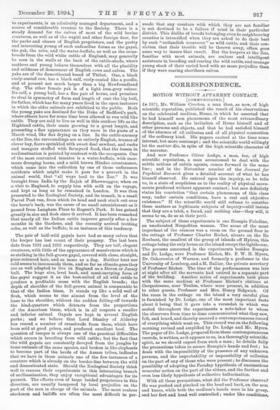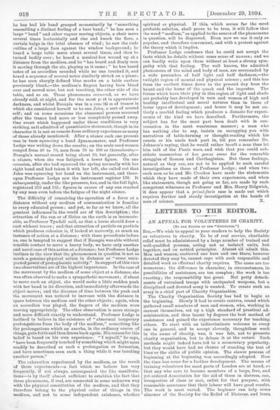CORRESPONDENCE.
MOTION WITHOUT APPARENT CONTACT.
[COMMUNICATED.] IN 1871, Mr. William Crookes, a man then, as now, of high scientific reputation, published the result of his observations on the celebrated medium, Home, in which he asserted that he had himself seen phenomena of the most extraordinary description, such as the levitation of Home himself and of other persons and objects, and that he had satisfied himself of the absence of all collusion and of all physical connection of the ordinary kind. His papers excited at the time some interest, but more contempt ; and the scientific world willingly let the mat ter die, in spite of the high scientific character of the narrator.
And now Professor Oliver Lodge, a man, too, of high scientific reputation, a man accustomed to deal with the subtle actions of subtle agents, comes forward in the same line ; and in the November number of the Journal for Psychical _Research gives a detailed account of what he has himself observed. He entered upon the inquiry, as he tells us, in a state of scepticism as to the reality of physical move- ments produced without apparent contact; but now definitely states his conviction "that certain phenomena of this class may, under certain conditions, have a real and objective existence." If the scientific world still refuses to consider these matters as legitimate subjects of inquiry—still insists that they are a trick, a fraud, and nothing else—they will, it seems to us, do so at their peril.
The subject of these experiments is one Eusapia Paladino, an uneducated Neapolitan woman. The Beene of the most important of the seances was a room on the ground floor in the cottage of Professor Charles Richet, situate on the Ile Roubant, the smallest of the group of islands off Hyeres, this cottage being the only house on the island except the lighthouse. The persons concerned in the experiments besides Eusapia and Dr. Lodge, were Professor Richet, Mr. F. W. H. Myers, Dr. Ochorowiez of Warsaw, and formerly a professor in the University of Lemberg, and a31. Ballier, the private secretary of Professor Richet. The time of the performances was late at night after all the servants had retired to a separate part of the building. Another series of experiments took place with the same medium at Professor Richet's chateau at Carqaciranne, near Toulon, where were present, in addition to other guests, Professor and Mrs. Henry Sidgwick. Of the room in the cottage on the island a very careful plan is furnished by Dr. Lodge, one of the most important facts about it being that it gave into a verandah in which was seated throughout the experiments a note-taker to whom the observers from time to time communicated what they saw, felt, and heard, and thereby secured a contemporaneous record of everything which went on. This record was on the following morning revised and amplified by Dr. Lodge and Mr. Myers. The paper of Dr. Lodge, prepared from these contemporaneous records, is written, as it appears to us, in a thoroughly scientific spirit, as we should expect from such a man ; he details fully the precautions taken to secure Eusapia's hands and feet ; he deals with the impossibility of the presence of any unknown persons, and the improbability or impossibility of collusion on the part of any of those who were present ; he discusses the possibility of adopting the Faraday hypothesis of unconscious muscular action on the part of the sitters, and the further and even less likely hypothesis of collective hallucination.
With all these precautions, what did the Professor observe P He was pushed and pinched on the head and back, on the arm and knees, while both the medium's hands were in hie grasp, and her feet and head well controlled ; under like conditions, he has had his hand grasped momentarily by "something resembling a distinct feeling of a bare band;" he has seen a large " band " and other vaguer moving objects, a chair move several times horizontally and rise and knock the floor, a curtain bulge in the total absence of wind ; he saw the rude outline of a large face against the window background ; he heard a large table move about several times, and then be turned bodily over ; he heard a musical-box wound up at a distance from the medium, and he "has beard and dimly seen it moving through the air, playing as it came ; " he has heard notes of an accordion sounded while no one touched it, and heard a sequence of several notes similarly struck on a piano; he has seen sharply defined blue marks on a table surface previously blank,—the medium's fingers having been blued over and moved near, but not touching, the other side of the table, and so on. These phenomena occurred, as we have already said, at night, and for the most p: rt in approximate darkness, and whilst Ensapia was in a con( iti al. of trance in which she considered herself to be one John, a sort of second self; and on some occasions the abnormal powers occurred after the trance had more or less completely passed away. One event which happened under these conditions is very striking, as it admitted of quantitative statement, though in its character it is not so remote from ordinary experience as many of those already mentioned. After a séance each one present was in turn squeezing a hand dynamometer, and Professor Lodge was writing down the results ; on the scale used women ranged from 40 to 70, men from 70 to 160 or thereabouts,— Eusapia's normal record being about 50, but generally, after a séance, when she was fatigued, a lower figure. On one occasion, after she had squeezed the spring normally with her right hand and had taken it with her left, she called out that John was squeezing her hand on the instrument, and there- upon Professor Lodge saw, the instrument register 138. It subsequently, under the like pressure, has, and in the full light, registered 210 and 155; figures in excess of any one reached by any man even before the fatigue of the night séance.
The difficulty of conceiving the operation of a force at a distance without any medium of communication is familiar to every educated person ; and yet, so far as we know, all the greatest influencesIn the world are of this description ; the attraction of the sun or of Sirius on the earth is as inconceiv- able, as Professor Tyndall said, as that a horse should draw a cart without traces ; and that attraction of particle on particle which produces cohesion is, if looked at narrowly, as much an instance of action at a distance ; with these precedents before us, one is tempted to suggest that if Ensapia was able without sensible contact to move a heavy body, we have only another and novel case of this action at a distance; but Professor Lodge inclines to the view that the phenomenon in question is not so much a genuine physical action in distance as "some unex- pected power of protoplasmic activity." In support of this view two observations are of the highest importance. In the case of the movement by the medium of some object at a distance, she was often observed to make a sympathetic movement ; if about to move such an object, she would make a little sudden push with her hand in its direction, and immediately afterwards the object moves; and the distance of time between the push and the movement was noticed to increase with the distance in space between the medium and the other objects ; again, when an accordion was played, the fingers of the medium were moving appropriately. The other observation is more strange and more difficult exactly to understand. Professor Lodge is inclined to believe in the existence of "abnormal temporary prolongations from the body of the medium," something like the prolongations which an ataceba, in the ordinary course of things, puts forth and then draws back again. His reason for this belief is based on his own experience. "I myself," he says, "have been frequently touched by something which might most readily be described as such a prolongation or formation, and have sometimes seen such a thing while it was touching another person."
The exhaustion experienced by the medium, as the result of these experiments—a fact which we believe has very frequently, if not always, accompanied the like manifesta- tions—is by itself almost sufficient to establish the fact that these phenomena, if real, are connected in some unknown way with the physical constitution of the medium, and that they therefore belong to the physical order of things in the medium, and not to some independent existence, whether
spiritual or physical. If this, which seems far the most probable solution, shall prove to be true, it will follow that the word "medium," as applied to the source of the phenomena in question, will be disproved. Even now we use it only as
and therefore convenient, and with a protest against the theory which it implies.
Professor Lodge confesses that he could not accept the facts which he details without some sense of nausea; and we can hardly write upon them without at least a strong sym- pathy with that feeling. The well known, the admitted phenomena of the mind and body of man, are surrounded by a wide penumbra of half light and half darkness,—the twilight region of mental and physical science ; and this has from the earliest times down to the present day been the haunt and the home of the quack and the impostor. The forces which have their play in this region of light and shade are probably less developed in men and women of high and healthy intellectual and moral natures than in those of lower types of development; and hence it may be not en- tirely a morbid feeling which produces a distaste for experi- ments of the kind we have described. Furthermore, the' subject has for the most part been dealt with in con- versation in the most wearisome manner ; a man who has nothing else to say, insists on occupying you with' narratives of table-turning or thought-reading which his cousin or his uncle took part in, till you remember Dr. Johnson's saying, that he would rather insult a man than let him talk of the Punic wars, and wish that you could sub- stitute mesmerism et hoc genus omne for the venerable struggles of Roman and Carthaginian. But these feelings, natural as they are, are not to be applied to such careful investigations as those of Professor Lodge ; and when two. such men as he and Mr. Crookes have made the statements which they have made of their own experiences, and when like statements, though not going so far, are made by such. competent witnesses as Professor and Mrs. Henry Sidgwick, it does appear that a prima-facie case is made out which requires further and steady investigation at the hands of



































 Previous page
Previous page